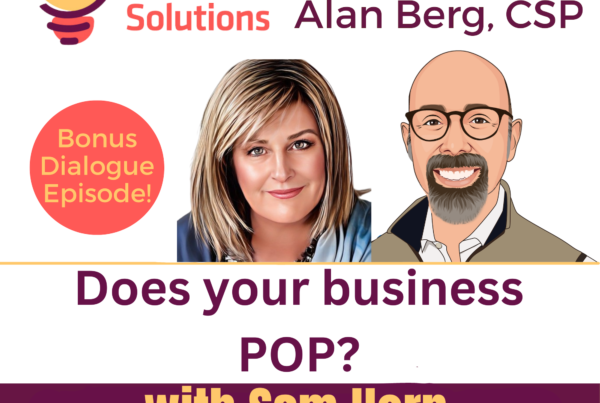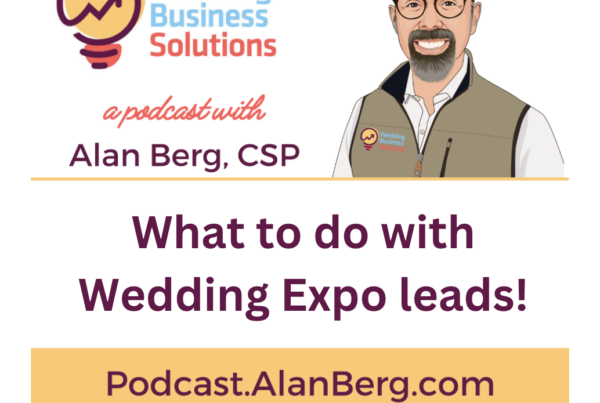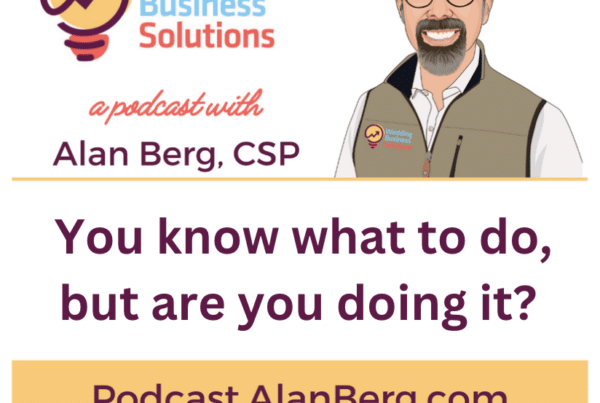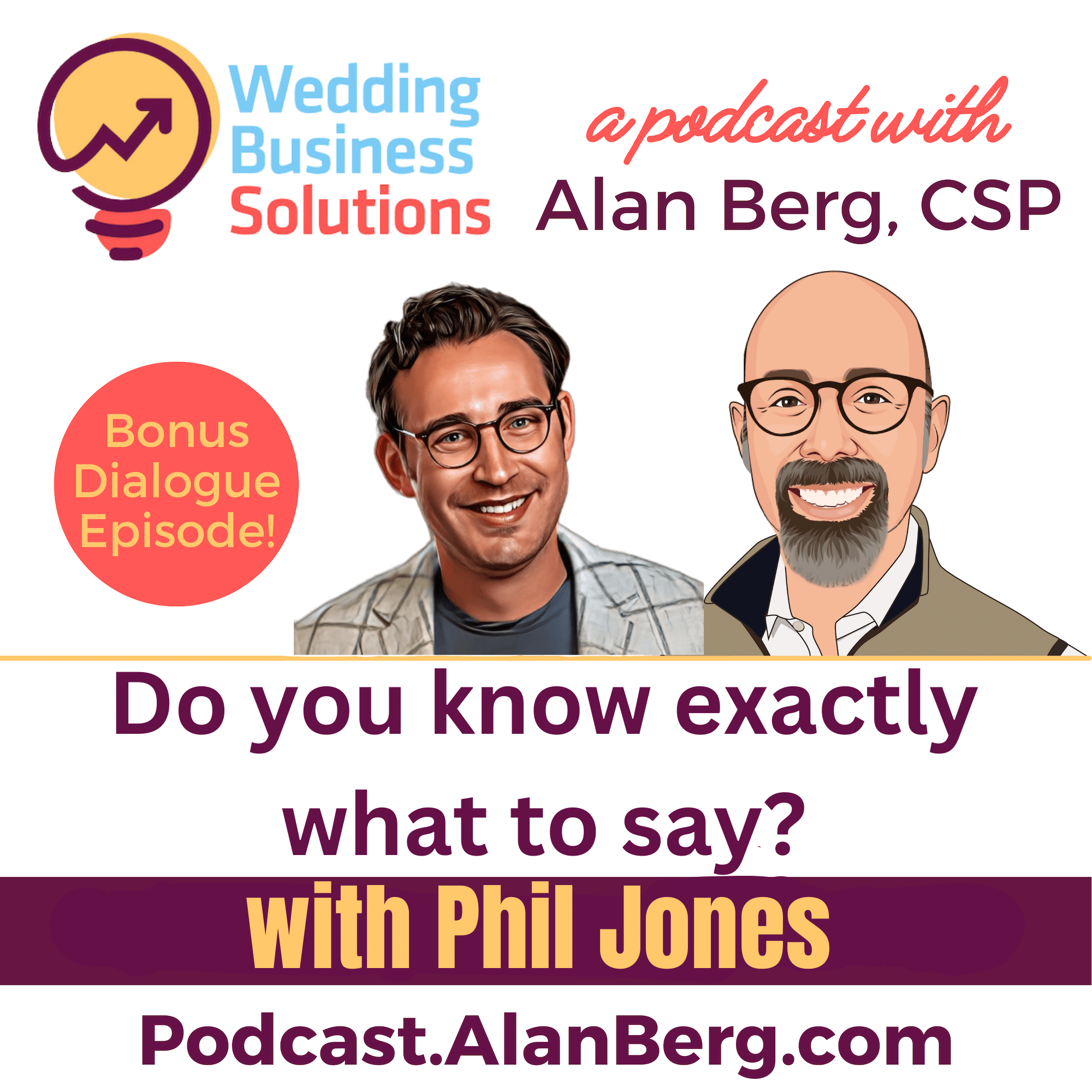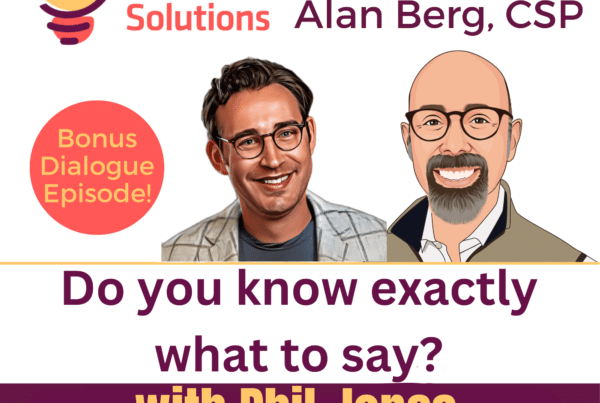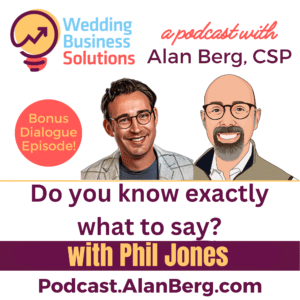 Phil M. Jones – Do you know exactly what to say?
Phil M. Jones – Do you know exactly what to say?
After reading Phil. M Jones’ audio book “Exactly what to say”, I was hooked. So many of the things he talks about apply to your businesses, and mine. And then I read “Exactly How to Sell” and “Persuade to get paid”, which just reinforced that I had to have Phil on here to talk about how his ideas and concepts apply to wedding and event businesses, like yours.
Listen to this new episode and hear common sense tips to help you, help more people buy your products and services.
If you have any questions about anything in this, or any of my podcasts, or have a suggestion for a topic or guest, please reach out directly to me at [email protected] or visit my website Podcast.AlanBerg.com
Please be sure to subscribe to this podcast and leave a review (thanks, it really does make a difference). If you want to get notifications of new episodes and upcoming workshops and webinars, you can sign up at www.ConnectWithAlanBerg.com
Do you know exactly what to say? Listen to this episode and you’ll find out. Hi, it’s Alan Berg. Welcome back to another episode of the Wedding Business Solutions podcast. I am so chuffed to have my friend Phil Jones on to talk about exactly what to say, exactly how to sell, and exactly how to do a whole lot of things. Phil, how you doing?
It was great to be here, Alan. And I love the purposeful reach for the word chuffed. I think that was perhaps intentional. And as somebody who cares about intentional language, appreciate you, Hatsip.
Yes.
And should we tell everybody what shuffed means? Because there’s a lot of people listening from the states.
Well, I’m not just send them out to the Internet to try and figure this out by themselves. Hit pause. Now try and figure out what on earth we are talking about.
There you go. There you go. So I’m speaking another language, if you didn’t know. But so Phil is a friend through National Speakers association and the PSA UK, either professional speakers association of the UK and Ireland, and where we happen to finally had a chance to actually sit down and talk and bond over a little bit of a mother’s milk there, a little bit of whiskey. And so much of what you talk about in your books and in your teachings and in your classes applies to what my audience does because it’s a lot of the same things that I’ve been talking about. But I feel like sometimes I’m the parent, but I need the neighbor’s parent. Like if they hear it from you, it’s brilliant, even though I might have said it. So some of the things you talk about.
So you have you started with exactly what to say? Is that, was that the first one?
My first book was a book called Toolbox. So I’ve done eleven books. But if we’re looking at the exactly series, then yeah, exactly what to say, exactly how to sell and then exactly where to start.
Right.
And I first heard exactly what to say. Matter of fact, you did it live, an audible original. And I’m listening to some of the people asking questions and they were friends of mine because I’m like, I know those voices. Like these were other speakers that you had in the audience and some of those people there. But one of the things in exactly how to sell, you said that a lot of businesses fail because they don’t know how to sell.
That’s right.
So let’s talk about that a little bit.
There becomes a point where interest in your products and services needs to move to intent in to the fact that I’m going to hire you, I’m going to book you, etcetera. And in many businesses, what you’re not dealing with is experienced buyers of your products and service. So what happens is you receive leads and inquiry that have probably been made to leads and inquiries on other people that are offering similar services. And the person that wins the business is almost always not the person that has the best service, the best product, or the best pricing. It is almost always the person that has the best customer experience of leading them from interest through to intent to help that person through the buying process in the most systemized fashion. Because the reality for most consumers, it isn’t, do I choose the bad version, the medium version, or the good version is they’ve inquired to three or more highly capable professionals. Let’s just say it’s wedding photographers. Right.
Not many people are experienced buyers of wedding photography. So the result of which is they reach out to three people. Everybody’s got beautiful photos, everybody’s got beautiful testimonials, everybody’s got a backstory. That one’s a friend of a friend, that one’s been highly related. That one I met a wedding expo. How do I choose? Well, I either need to be differentiating on price. Ah, that just confuses me. That one’s 3000, that one’s 5000, that one’s 7000.
Ah, I don’t know what to do. So the person they end up choosing is the one that can help them navigate that decision making process. Yeah, in the most efficient way.
And another something in your book which make it easy for them to buy.
That’s right.
So what are some of the things you see people doing that make it harder?
Adding complexity is what it almost always comes down to. Adding complexity a confused buyer can never buy. And sometimes this can be. Which of our 17 packages would you like to choose?
Right, right.
We’d love to quote you for the catering for your event. Please. Can you just choose your precise and accurate menu and then from that point in time we’ll tell you exactly what that would be. And can you please let me know how many staff you’d like to be educated the event? And you’re like, I don’t know how to complete this questionnaire, let alone actually provide you a full brief. Like, this is too much information pass on to next. So the adding of complexity is a mistake that often slows people down.
Yeah.
I think another thing that slows people down is a miss that what most consumers are looking for is they’re looking for confidence around the fact that whatever they’re asking you to do, have you done this before? Have you done it recently? And have you done it for someone like me? So if you’re not a yes, yes, yes in that camp, then it’s an uphill struggle. So your conversations and your marketing materials and all of your sales support communication tools should be towards convincing the person that you know you’d like to do business with that I’ve done this before. I’ve done it recently, and I’ve done it for someone like you. Those three things will deliver more confidence than anything else. So missing on that. And then a third thing that I would say that stops people in achieving sales success is sounding desperate.
Yeah.
Applying unnecessary pressure is forcing things like you need it and desperately harrowing for a deposit that quite clearly sounds like you needed to pay your rent on.
Thursday when you said sales is earning the right to make a recommendation.
That’s right.
Right.
As opposed to pressuring somebody to buy. You shouldn’t have to pressure them to buy if you’ve gotten to this point.
Well, in the medical industry, they say that prescription before diagnosis is malpractice.
Right.
The same is true in the wedding service business, is what we should look to be able to say to anybody before making a recommendation is we should look to be able to say the words. Because of the fact that you said.
Right.
Because of the fact that you said that it’s imperative that you capture not just the photographs here, but the photographs here, here and here as well. For that reason, we’d recommend that you have a second shooter at the event. And that way what you have is people giving dedicated attention and effort towards the two separate high priority functions that are happening at that moment in time. Meaning that you capture not just the moments, but all the expressions of the people within those moments, giving you the treasured measure memories for years to come. Right. Like that’s the recommendation. Not, here’s why you need a second shooter.
Right.
Well, it comes down to the why. You know, every, every great photographer sells the same Watt. The watt doesn’t look any different. Every dj the watt looks the same. Every caterer the watt looks the same. And when they all have five star reviews and when they’re all recommended by these other people. And how do they look different? Well, because if you’re selling what you do, the cheaper price is going to win.
It has to.
It has to every time.
I mean, people don’t have any other buying criteria. And it’s not always the cheapest price, Alan, is what actually ends up happening. People borrow a buying habit from elsewhere. So if you’re the kind of person that when handed a wine list and you don’t know a lot about wine, you pick the cheapest, you will pick the cheapest wedding photographer. If when you’re handed a wine list and you don’t know a lot about wine is you shoot for the one in the middle, you’ll borrow that same buying habit. And if you’re the kind of person that looks at wine list and says, how can I pick the most expensive thing here? For whatever reason I’m choosing, you’ll do the same thing when buying a wedding photographer. So they borrow an existing buying habit, they’re not making an informed decision, they’re borrowing a buying habit from somewhere else in their life.
Right.
So again, in guiding them, another thing that I love that you said is you need to remain in control. Control is not pressure. Control is not aggressive.
Right.
So talk about that a little bit. Remaining in control, how?
Um, navigating a sales conversation is a leadership conversation. You are leading the other person towards the right outcome for them. Maintaining in control of the conversation also means being somewhat neutral, not looking to pressure or push somebody towards a predetermined outcome, looking to try and help somebody make the micro decisions that make the big decision an easy, small decision. So what does that look like when you’re speaking to a potential buyer or seller of the services that you provide? What you’re really looking to play a game of is if this is true, then what else must be true? So, for example, is going down a process of discovery remaining neutral? If you’re a wedding dj may well be understanding all of the moments of entertainment that happened from the moment that people start arriving at the party to the moment that people might look to be able to leave the party. It might also be a series of discovery questions like, well, what is your experience of hiring entertainers in the past? Why would that question be useful? Because somebody might chirp up and say, well, in my role at my company, I’ve been involved in events and we’ve done this and we’ve done this and we’ve done this. So we get in some form of context. It might be further questions like, well, what do you understand about all of your options when it comes to being under service to these needs? They’re going to say, not much. You say things like, well, would it help if I walked you through those options? They’re going to say, yeah, sure, that would be helpful.
You can then walk them through the options with micro gateways to say, is it left or is it right? Is it left or is it right? Is it left or is it right? As we go through this. So when it comes to people on arrival, are you looking for custom music at that point that is in line with the energy and the environment that exists at that point in our time together? Or would you resort to just somebody hitting play on the in house sonos system with a pre recorded playlist?
Right.
So questions, you know, again, not, you’re not selling. You’re not going through a sales pitch. I say sales pitches are fine for training and then throw them away because now you know what you’re doing and you need to be able to jump around. You can’t go from a to z because not everybody needs that.
Well, it’s like a pantry of ingredients is we’ll come back to the wedding dj experience, is if a wedding dj has been a dj for some time, is they know some things that work together pretty well. They understand that I can jump from this track to this track to this track to this track, and that will build most sets of circumstances. In fact, 85% of the time, they can play a version of the exact same playlist in the exact same order at the exact same times of day and everything will go swimmingly. But the 15% of the time that it doesn’t, they need to be able to read the moments to be able to say, aha, this isn’t the time for us to be able to play Sweet Caroline.
Right?
We’re not doing sweet Caroline at this given point in time because it’s highly irrelevant for the group of people I’m looking at and the moment and the energy of what’s happening in the room. I need to be able to feed off that. So I believe that actually, for any known conversations, we should be ready, ready, ready for them. I believe with out any difference of opinion, that the worst time to think about the thing you’re going to say is in the moment that you’re saying it. And just like you have a prepared set list to be able to deliver the music in front of an audience, then shouldn’t you have a prepared set list to deal with every known question, every repeatable framework in conversation that shows up in all of your sales conversations with your clients and your prospects and be ready, ready, ready for that?
Well, again, I think you should, because those answers are in your filing cabinet, they’re in your Rolodex, that you can say, I asked this question, 85% of the time they’re going to say this, and now I’m going to say that, but that 15%, I have to pull a different file now and go there. It’s why I call it hitting the reset button. You can’t bring the last conversation you it had into this, except if you made the sale, that energy you can bring in, that’s okay. But the conversation is because they’re different people. And even though you might be right 85% of the time, you won’t be right.
You have to leave space. Is this one of the 15 and 100 that’s going in a different direction? And I’ve got to be ready to catch that before it gets presented to me, right before it becomes a problem, I have to see that that might be the direction this is going so I can lead it. And that’s, again, what I mean by being in control is you control the energy on a dance floor by seeing that it’s going to go in the wrong direction. Therefore, you don’t reach for that track. What you don’t do is play the wrong track, see it, make a bad situation worse, and then go. Should have done something different. That’s what I mean by staying in control. And control is responsibility.
That’s what control is. It’s being responsible for the fact that I have a duty of care towards this moment, to lead this towards an outcome that is better for the other person.
So the clearer that it is. Right, I say, to take away the ambiguity, what are the next steps? What’s going to happen? Those of you watching on video, you can see a sign, I’ve probably shown it before. Ambiguous. Next steps bring ambiguous results. So being in control is also. They understand that you understand, this is where we’re going. This is what’s going to happen. And that’s, again, not aggressive, that’s just guiding them because they haven’t done this before.
They need your help.
Right.
So let’s talk about some words. You talk about words that people should remove from their lexicon. Words like if.
Right, yeah. Right.
And. But, right. Why is if a bad word?
It’s not necessarily a bad word. It’s a word that should be understood for its purpose, like a hammer. Isn’t necessarily a bad thing to have in your bag if you’re a carpenter. It’s a bad thing to have in your bag if you’re looking to take a flight. So the words if aren’t necessarily a bad word. What they are is misinterpreted. Simple example would be that if I was to say, if you’re to hire me as a photographer for your event, then what I’ve done is I’ve used future conditional tense. And by future conditional tense that’s me saying this doesn’t need to happen.
Not today, not ever. If I swap the word if for when and say when you hire us to support your event, then what happens is I’m using present active tense. All of a sudden, in their minds eye they’ve jumped forward to the imagination of hiring us, working with us. They’ve seen themselves in a situation where we are their photographer for their event. So we swap ifs or whens on purpose.
Okay.
And that’s the point is that you’re purposefully doing that. You talked about cost versus investment. Now I see you mentioned photographers. Photographers love to have a tab on their website menu that says investment as opposed to pricing.
Right?
Now I know the intention its an investment in the success of your wedding and stuff like that. But couples arent looking for investments, theyre looking for the price. To me this is a place where once they get to the page you can talk about how its an investment. But I would label that pricing on your menu bar so that they find what theyre actually looking for. And then you get to tell your story. Which is choosing the right photographer is an investment in the success of having the right photos or whatever. So again, this is act. What did you say? Intentionally choosing the word, choosing the word the right way.
We versus you. Who’s benefiting here?
Well, the least influential word on the planet is the word I. The second least influential word on the planet, particularly in sales copy, is the word we. If you are the most important person in your life, understand that they are the most important person in their life. So swap as many of your I’s as you can for yous, as many as the wes as you can for yous. When you say we pride ourselves on well, welcome to the applause party for oneself. When you say what we offer is this and this and this and this, then what you’re doing is you’re owning those services. Instead of saying what we offer is you could say what you benefit from. From choosing ABBC photography is you get access to a comprehensive service that includes ba boom, ba boom, boom boom boom boom.
We are back in present active tense, helping people see themselves and feel themselves in the reality of your services. Now, my belief is that every word that leaves your mouth, leaves your pen, leaves your keyboard is helping or hurting. Every word is helping or hurting. Nothing is neutral here. A tiny little example. I can imagine there are at least two people listening to this podcast right now that if they checked on their website, right now they’ve got a contact form on their website somewhere, and that contact form is designed to generate leads and inquiries. Generate leads and inquiries. They’ve got a form.
It says, first name, last name, email address, phone number, comments. Then there’s a big button on the bottom, and the big button on the bottom says submit. In my mind, the word submit should be reserved for the WWE doesn’t belong on a web form, not of that nature. If you want to increase the level of conversions on that form, then remove the friction. Take the word submit, swap it for the word next, put two little arrows next to it and watch how your form completion goes up. Look at things like what happens when they hit the next button. You said a second ago around next steps and being ambiguous. If it’s not clear, how clear is it when somebody hits your submit button to what’s going to happen next? If you swap the word submit for the word next, they hit the next button, they land on a page that says.
So the next step on from here is that we’re going to receive your inquiry. You’re going to get a personal outreach from Colin, who’s the founder of the photography company, who’s going to learn more about your unique event, your unique circumstances, and walk you through multiple different options of how we can support your next event. Expect to hear in the next 24 hours. And then personalized email lands in six minutes. Where are we? We’re in a completely different place. Instead it says submit. And then the default option says your form has been received and the other person’s like, got it. I have no idea what that means exactly.
Let me go and fill out three to five more forms with other people.
Right.
And we could have a whole discussion about the long forms and all that kind of stuff. And so, getting back to you for a second, when, when I saw you in you in the UK at that onference, I did a presentation on websites. I call it the, you test. You just go edit, find, pop up the search box, type the word you. It either appears on your page or it doesn’t appear on your page. And so many people. Yesterday I was actually doing a consultation for a speaker here at a Texas, his homepage.
Great.
You was all over the place. The other pages, it wasn’t there. It’s like, he did such a great job on this one page, and then it just wasn’t there on the other pages. There. Another Phil quote, success is doing the basics to a high standard consistently. So this guy wasn’t consistent. He did it really well. And then just some of the time.
In one of the spots.
Right, there you go. Should we get. Should we talk about what Jedi means?
We can do. Yeah, we can do. And that showed up as an acronym inside of a coaching group, coaching community that I ran for some time. And what we would struggle with with that group is, like many people, they can write meaningful action plans. They can get clear on the to do list of what’s required to get them from where they are to where they want to be. And they’d then procrastinate on actually executing on the action plan. They would become what I would call experts in getting ready. Like absolute masters, just staying in that almost ready.
Experts in getting ready. So what I did is I created a challenge for that entire coaching group that said, tomorrow we’re going to have a Jedi day. And you can think this group of people like a Jedi day. That sounds cool. We’re going to be awesome. What we’re going to do is, I don’t know. I didn’t tell them what a Jedi day was. I said, tomorrow is your Jedi day.
And then what I did is I borrowed some of the language from our dear friends over Phil Knight’s business, Nike, which have a powerful slogan called, I think it’s just do it. I think some of us might have heard that before I took the word Jedi, created the acronym just effing do it, with, obviously, the e standing for effing. And that created some momentum through people realizing what the task was of being asked for them. I encourage more and more people to have Jedi days in their world. You know what you need to do. You know the actions that you need to be able to take. You know what the difference is as to how you’re operating now and how you’d like to be operating. And you know that you are responsible for being able to make that change.
So my. My advice is simply to just effing do it.
Yeah, that’s it.
Just take the action. You don’t get any success there.
What was nice about that, though, Alan, too, is it can create a universal language inside of things like a household. And what can be challenging as solopreneurs sometimes is you have these moments of inspiration, these like, little whims of momentum towards you, creating a change in your life. And that you get all excited about all this extra effort that you’re going to put in. And then you open your office door and you step out and they’re like, are you going to help me put these groceries away? Or are you picking the kids up tonight or not? And some form of pattern interrupt comes in, and the momentum you had towards the actions you were looking to take all of a sudden got lost. So acronyms like Jedi allow you to communicate with this people in your household that affect your performance and your productivity by you being able to say things like, hey, honey, I’m having a Jedi day today. And you can build rules around what that really means. So that it means, get the heck out of our way. I’m trying to work through a monster to do list, a monster task list.
This is important. It’s important for us. It’s important for our life. It’s important for our family. It’s probably more important than many of the things that you could be asking for my attention on. So unless it’s this, this, this, or this. Yeah, then please let me keep my head down and keep to work.
And you can do this. If you have a team, whether you have a team of two, a team of three, or whatever, you can say, hey, today’s a Jedi day, because we need to do this. We need to work on our business right now. We’ve been working in it. We need to work on it. Um, yeah. So, all right, let’s. Let’s change gears just a little bit here, because we.
I try to keep this to about 30 minutes. I love that you said the existence of competitors in your area proves that you have a viable market, because I hear people complaining all the time. Oh, a new barn venue opened up. Oh, there’s a new whatever. I like to remind them that, weren’t you the new one once? Like, wasn’t that you like.
Yep.
Why we complain about them when that was you? But it. They wouldn’t be coming in if there weren’t business, right?
Correct.
Yeah.
So, you know, if you wanted a.
Pizza restaurant and a successful pizza restaurant, there’d be worse places to go than New York City.
Yeah.
How many within four blocks of York City?
Because they want to eat New York City pizza. It would be a hell of a job to say, well, what I’m going to do is I’m going to start a deep dish pizza restaurant in Hawaii. I’m going to be the only deep dish pizza restaurant in Hawaii. That would feel like an uphill struggle. But opening a deep dish pizza restaurant in Chicago, where people meaningfully travel to Chicago to eat deep dish, then all you have to work out is, how do you compare to the rest of the market? So if there’s a new barn venue that’s opened up down the street? Well, what is it that makes you different? Are you cheaper? Are you bigger? Do you have better parking? Are you open longer? Do you allow outside catering that other people provide? In house catering? Catering. Do you provide in house catering and that provides a better solution? Is there the ability for people to store personal effects ahead of time? Do you provide a level of safety or security that makes you better or different? Like, what is it that makes you the obvious choice in the 50 50 gateways? And understand, 50 50 gateways control most decision making in life. They’re left right decisions. So if you’re in a highly competitive market, find the twelve to 2050 gateways that exist in the decision making process.
Do I want somebody premium and expensive? Or do I want somebody that is cheap and a friend of a friend? 50 50 gateway. Okay, if I’m choosing premium and experienced, am I looking for somebody that’s premium experienced, young and agile and vibrant, or experienced and tenured with a proven track record over 30 years, which one of those am I going to flex as the best? Oh, you want young and vibrant and sexy and they’ve done it recently. But if I want somebody who’s young and sexy and vibrant and done this recently, do I want somebody with a proven track record of other known individuals that are aspirational to me, or do I want somebody with a quantity of sameness that’s done this 10,000 times before? Oh, they’re probably going to want like the celeb famous aspirational look. Well, we’re going to set our stall out that way. So when you look at all the 50 fifties, you can start to build the narrative that says, if you’re that, I’m for you and not the one. If you’re that and that and that and that and that and that and that and that and that marketplace of one.
Right.
And that’s what you’re looking to be able to do is within a busy marketplace, trust the fact that there is a high demand for the type of service that you provide, then find your people within that crowd of missing people.
And the markets in most places are big enough that that’s why they came in, there’s enough for you. But I think what you just saying there is, I don’t think enough people listening know who they’re the one of I can articulate. I’m the one that does this, then that’s how I’m different.
It’s tough. And the first question to ask yourself is, how many new customers would you like in the next twelve months? Because most people can’t answer that question. No, they jump to, like, as many as I can get. Loads, hundreds, thousands. I’m like, great, okay, you own a wedding venue. If I can get you 7442 customers ready to do business with you in 2024, are you ready? And they’re like, no, that’s too many. I’m like, okay, so if there’s a number that’s too many and there’s a number that’s too few, that must mean there’s a number between those two numbers. That’s just right.
And guess what? You get to pick.
Yeah, right.
Like I do. I’m like, yeah, you do. And remember, this is, if you’re not choosing the customers that you’d like to work with, it’s highly possible that they might be choosing you. And if they are choosing you, one of the big reasons they could be choosing you is because somebody else decided they didn’t want them anymore, which could mean that you are looking to feed on other people’s waste. That doesn’t feel so sexy. As an independent business owner, imagine that you’re in a scenario. The scenario is this is you’re in a shopping mall, and you got a couple of kids alongside you. You’re walking through the shopping mall, couple of kids alongside you.
You see an item in a store that you quite like. You walk towards the thing. You hold it up to take a closer look. You turn back for the opinion of the kids, and in that moment, the children are gone. For most of you listening, that would be panic, desperation, despair. At least one or two of you be thinking, finally, peace. Then the reality kicks in. Says, must find the children.
Must find the children. Must find the children. Knowing you must find the children, how well would you describe them to a stranger in the street? To increase your chance of finding them, you give them everything you’ve got, right? Hair color, eye color, what they were wearing. Reach for a photograph on your phone. You’d share that description with everyone on your way to finding anybody that had leverage, like police services, security services, somebody who had access to closed service tv. And isn’t that what we do with missing people? And every business owner has missing people. You cannot find the missing people in your life if you haven’t taken the time to define and describe the missing people in your life. And if you’re not choosing them, that means that they’re choosing you.
And if you’re picking anybody and everybody, and I know that most of you on this call right now have capacity. That is, there is a finite number of people that you can service. If you’re not choosing them, then you could spend a giant chunk of your life working with people that don’t make you happy.
Right.
Choose the people that make you happy and then go looking for them. And you don’t. You’re not in the wedding venue business, or the wedding photography business, or the mobile disc jockey business, or the catering events business, or the rental of services business. You’re in the people business. So define the people you’re looking to help and then get clear on the ways that you help those people. That’s how you build a value prop people first, problem second.
Right.
And again, your results are unique. And if you can’t explain what your results are to people, why should they buy them? Because they’re just going to look like everybody else’s.
That’s right.
Yeah.
Listen, we could do this all day. I appreciate I’m looking at the clock here going, no, we got to stop talking. Maybe I’ll get you back on to talk again. So we’re going to have in the show notes, but the website where they can find out more about you and find your books and things.
Yeah, I mean, stop by exactly what to say.com dot. We have a plethora of content there from varied contributors that talk about the power of words and how you can show up with more intention in all areas of your life to achieve better outcomes. And then if you want to learn more from me personally, search Phil M. Jones and you’ll find me pretty much everywhere you could be looking.
Yep.
Absolutely you will. Phil, thank you so much for joining me again. Thank you for sharing your wisdom with our group. Listen to that. Read his books. If you do audio like I do, Phil reads them himself so he can read you his books. I have to look into the rest of them now because I think I’ve only read four, so I think I have some reading to do over here. But thanks for joining me.
I appreciate it.
Thanks, Alan. Delight to be on the show.
I’m Alan Berg. Thanks for listening. If you have any questions about this or if you’d like to suggest other topics for “The Wedding Business Solutions Podcast” please let me know. My email is [email protected]. Look forward to seeing you on the next episode. Thanks.
Listen to this and all episodes on Apple Podcast, YouTube or your favorite app/site
- Apple Podcast http//bit.ly/weddingbusinesssolutions
- YouTube www.WeddingBusinessSolutionsPodcast.tv
- Spotify https//spoti.fi/3sGsuB8
- Stitcher http//bit.ly/wbsstitcher
- Google Podcast http//bit.ly/wbsgoogle
- iHeart Radio https//ihr.fm/31C9Mic
- Pandora http//bit.ly/wbspandora
©2024 Wedding Business Solutions LLC & AlanBerg.com
